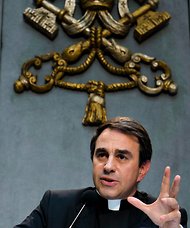Report Sees Flaws in Workings of the Vatican Bank
By Elisabetta Povoledo
The 241-page report by Moneyval, a committee of financial experts that evaluates measures to combat money-laundering and terrorist financing, praised the Holy See for having come “a long way in a very short period of time” but also noted that “further important issues still need addressing in order to demonstrate that fully effective regime has been instituted in practice.” The Vatican, whose secretive bank has been embroiled in scandals in the past, acknowledged on Wednesday that the reform process would take time but pledged to pursue change in its efforts to present a more modern — and open — image of its guarded financial institutions. “We take both the praise and criticism contained in the report with seriousness,” Msgr. Ettore Balestrero, the Vatican’s under secretary of state, said at a news conference here Wednesday. “The report released today is not an end, but a milestone in our continuing efforts,” he said, adding that the Holy See would focus on those areas in which it was found to be insufficiently compliant. Moneyval’s executive secretary, John Ringguth, said the Holy See — which is both a country and the seat of the Roman Catholic Church — presented evaluators with unique challenges that Vatican officials worked to resolve. “An unusually large amount of documentation was seen during the course of the assessment,” he said in a telephone interview. The Holy See’s primary financial institution — the Institute for Works of Religion, also known as the Vatican Bank — has fallen under the scrutiny of Italian prosecutors, who are investigating possible money-laundering charges. Earlier this year, the bank suddenly ousted its president, Ettore Gotti Tedeschi. The so-called Vatileaks scandal included the leaking of documents that pointed to possible financial mismanagement in Vatican offices. In the past, the bank was embroiled in scandals, most notably the still-murky 1982 death of Roberto Calvi, the chairman of Banco Ambrosiano, known as God’s banker because of his ties to the Holy See. Banco Ambrosiano collapsed after the disappearance of more than $1 billion in loans to companies in Latin America. The Vatican bank denied wrongdoing but paid $250 million to Banco Ambrosiano’s creditors. But over the years, the Vatican has made efforts to clean up its financial image. In December 2010, Pope Benedict XVI personally passed a reform to counter illegal activities in the financial sector and established an authority to monitor financial dealings in Vatican City and other Holy See institutions, a prerequisite for its undergoing evaluation by Moneyval. The Moneyval report said that compared with other countries that have had anti-money-laundering and terrorist financing laws in place for years, the Vatican worked quickly to institute its regime. But it said the Vatican had fallen short both in the scope of some of the reforms and in their adoption. Over all, of the 49 recommendations under evaluation, four were found to be nonapplicable. In the case of the other 45, the Holy See was found to be partially compliant or noncompliant in 23 of the recommendations and as compliant or largely compliant in 22. The committee does not and did not investigate charges of wrongdoing, but instead focuses on the adoption of global standards. Mr. Ringguth said that the Vatican’s financial watchdog agency lacked clarity regarding its responsibilities, powers, independence and authority. It was unusual, too, that the authority had not undertaken any inspections, at least in the first seven months after it was established, when Moneyval evaluators analyzed the structure. There had also been few reports of suspicious financial activity. The report “strongly recommended” that the Vatican Bank be “independently supervised by a prudential supervisor in the near future” and that senior management adhere to “fit and proper” criteria. The report also noted that a number of nonprofit organizations operating within the Holy See fell outside any controls. Evaluators also identified “a number of areas” where risks “may be greater in the context of the Holy See than perhaps have been realized” — for instance, cash transactions — and called on the Vatican to enact a risk assessment process that takes into account the “unique circumstances of the Vatican,” Mr. Ringguth said.
|
.
Any original material on these pages is copyright © BishopAccountability.org 2004. Reproduce freely with attribution.
